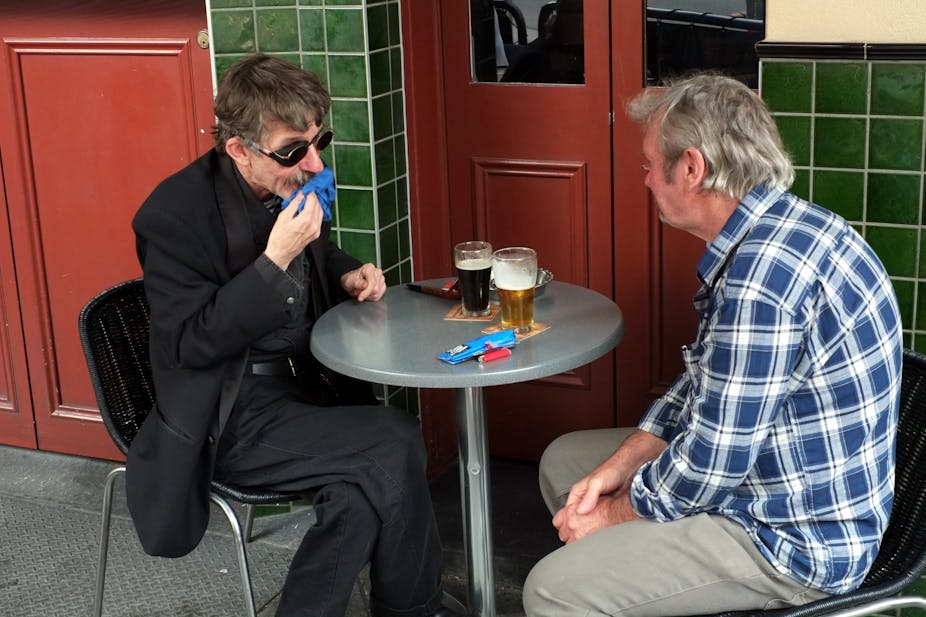If you had to argue for the merits of one Australian book, one piece of writing, what would it be? Welcome back to our occasional series in which our authors make the case for a work of their choosing. See the end of this article for information on how to get involved.
When David Ireland’s The Glass Canoe was published in 1976 it was a novel completely fresh and different for the time, a novel written by an ex-oil refinery worker and set in a western Sydney pub, the Southern Cross.
I don’t recall any Australian novel ever having the same impact on me. Margaret Atwood wrote there is only one real question to be asked about any literary work, and that is: is it alive or is it dead?

The Glass Canoe is filled with energy, raw sex, lashings of violence, laconic humour and rivers of flowing beer — Old and Reschs. It captures a stratum of Australian society that was dying even then, the pre-multicultural working-class men and women whose territory was the Mead and whose watering hole was the Cross:
The next tribe west drank at the Bull, and on the other side the nearest tribe holed up at the Exchange … you never went walkabout to another tribe’s waterhole. Unless there was trouble.
Written in fragmented chapters, some half a dozen lines long, others consisting of two or three pages, The Glass Canoe paints a vigorous picture of a lost tribe of territorial knockabouts with names like Alky Jack, Meat Man, Aussie Bob and The King:
Once he was King of Parramatta. Not recognized in social columns. Only pubs.
Trouble in the Cross starts with a look, the wrong tone, a stranger walking into the Cross, and then it’s outside to settle matters.
“I’ll have you,” said Mick. “Hold his arms.” “Dead set.” “He’s died in the arse.” “Let’s go.” An hour later the stranger stumbles back inside the bar, his beer is still there, flat as a tack. The tribe won’t roll him. They have their code. They have their customs. They have their own language as well: short, sharp and direct exchanges, often poetic, frequently coarse.
There is no attempt to idealise or romanticise the working-class regulars. No room for sentimentality or middle-class morality here. These are the forgotten men and women of this country. They will never make history. They will endure it. They age and they die. No-one remembers their faces, no-one writes their stories. They have little ideology and are much the better for it.
The book is narrated through the voice of Meat Man who works as a groundsman at the golf course; and Meat loves the trees and the curve of the fairways and the dull silver dew.
Some lunch times he lies face down on the grass and smells it. But the days are never long enough. Meat drinks faster. His thirst is never quenched. When he finds a man hanging in the darkness in the old toilet block behind the pub — “He’d stopped swinging so I knew he must be dead. There was no hurry.” — he finishes his piss before he walks out to tell the barmaid and buy another beer.
There are more funerals than weddings. Aussie Bob loses his two sons in a high-speed car crash, then is crushed in a work accident at the plant. The Darkfella is making a delivery on Captain Cook drive when a car on the wrong side of the road pins him to the front of his van: 15 days in a coma, and at the end of it pneumonia and death.
There are no happy endings for the tribe. Even the Cross is dying, its tiles cracked, roof sagging, walls chipped:
It lay sprawled on its uneven block of bare ground like a beached whale, a great wounded fish; old and damaged …
It is testament to the resilience of the forgotten men and women of the Cross that they struggle on regardless.
A woman moves in with her bloke in a station-wagon parked near her husband’s place. Down the back of the pub, kids shoot at butterflies with air guns, the pellets tinkling off the glass windows or making little dents in the cars in the car park.
Ireland does not judge his characters; there is no hidden message other than human life is short, bitter and sweet. While the inhabitants of this waterhole await their turn to be ferried across the river Styx in their glass canoes to the underworld, they try to cram as much fighting, drinking and fornicating into their lives as they can; the women are as desperate for contact as the men: the barmaids, a crim’s missus:
She was against me in a flash, pressed up tight. Every bit of her, feet and legs and thighs and belly … Her tongue – I got a sight of it just before, all coated with white – rammed into my mouth and round like a propeller.
The Glass Canoe is a poetic mediation on human existence. It is an Australian novel that, to answer Margaret Atwood’s question, is alive and kicking.
Are you an academic or researcher? Is there an Australian book or piece of writing – fiction or non-fiction, contemporary or historical – you would like to make the case for? Contact the Arts + Culture editor with your idea.
Further reading:
The case for Capital, Volume One by Anthony Macris
The case for Gularabulu by Paddy Roe
The case for The Fortunes of Richard Mahony by Henry Handel Richardson
The case for Kim Scott’s That Deadman Dance
The Case for John Bryson’s Evil Angels
The case for Henry Handel Richardson’s The Getting of Wisdom
The case for Sheilas, Wogs and Poofters by Johnny Warren
The case for The Ghost’s Child by Sonya Hartnett

